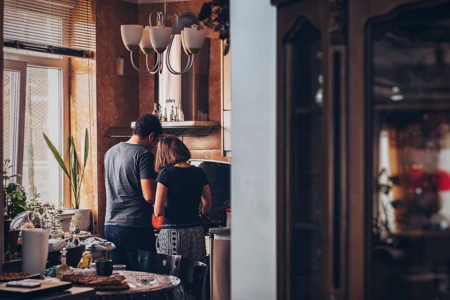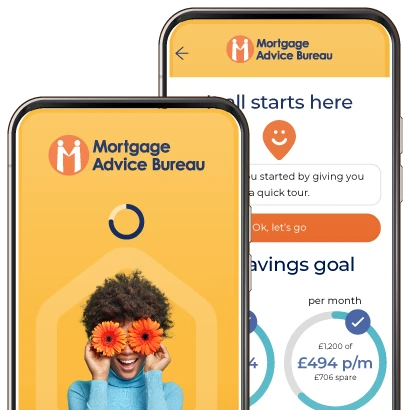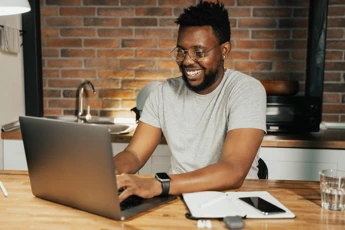If you’re looking to buy your first home but feel that your deposit is too small to get started, you’re not alone. Thousands of current homeowners have been in the exact same situation, so don’t lose hope.
We’ll talk you through exactly what you need to do to get your first foot on the property ladder, even if you don't have as large a deposit as you'd ideally want.
What is a mortgage deposit?
A mortgage deposit is a lump sum amount of money that you pay upfront when you’re buying a house. It will usually need to be at least 5% of the value of the property you’re hoping to buy. What's more, the bigger your deposit, the smaller the mortgage you’ll need to take out to pay for the rest of the property's value.
Our borrowing calculator can give you an idea of how much you can borrow based on your deposit.
How can I save for a deposit?
This is usually the question that tends to require the most thought. Nevertheless, with a few simple tips and tools, you’ll have enough to put down sooner than you may think. Here are a few steps to get you started:
Cut down on your spending
If you’re committed to buying your first home, ensure you’re doing everything you can to save as much as possible towards your deposit. It’s also worth noting that cutting down on unnecessary spending, as this has the added benefit of showing lenders you’re sensible with your money.
If you don’t know where to start, try some of the following:
- Create a separate savings pot – If you want to make sure you’re saving money and not touching it, a separate savings pot/account is a good place to start
- Make use of price comparison websites – Whether it's utility bills, insurance, or even your weekly food shop, price comparison websites can help you save hundreds of pounds
- Download a saving/budgeting app – Try downloading a saving/budgeting app, as this does the hard work for you. For instance, our HomeBuying app helps you to calculate exactly how close you are to reaching your savings goals.
If you need a bit more help managing your finances, check out our budget calculator.
Make your savings work for you
In addition to saving up your money, it’s equally important to make sure you’re saving in the right places. Saving into a Lifetime ISA is a brilliant way to boost your savings when you’re buying your first home. But how exactly do they work?
- You can put in up to £4,000 each year until you’re 50 years old.
- The government will add a 25% bonus to your savings - up to a maximum of £1,000 per year.
- You can save lump sums - you don’t need to commit to saving each month.
There are some rules you should be aware of first, though. For example, you must be over 18 years old but under 40 to open a Lifetime ISA. The money can also only be used for a first home, or saved for later life.
How our app can help you save for a deposit
While we're on the subject of savings (and making them work for you), we wanted to talk about tracking your savings. This is an important part of the process, as you can see when you're getting close to your goal and if you need to put more work in.
The My MAB app makes this easy, with a built-in savings tracker that you can use to record your savings. It will tell you when you're getting close to your deposit requirements, and is packed with helpful articles to help you master the art of saving money.
The best part is that it's free, which is a win for your budget!
You can download the app for free by following the links below:
Improve your credit score
When you apply for a mortgage, lenders will look at your credit ratings to decide whether to lend to you, how much you can borrow, and sometimes how much interest to charge.
Improving your credit score will increase your chances of having your mortgage application accepted. If you have a small deposit, your mortgage lender will have to loan you a larger amount of money. However, you’d need to be fairly certain they’d be able to pay it back. With this in mind, you must make sure that you’re seen as financially reliable in order to be eligible for a mortgage.
The first step is to check your current credit scores There are three main credit agencies that hold credit reports on you: Experian, Equifax and TransUnion. It’s a good idea to check all three reports carefully, and if you spot any mistakes, it’s very important to get these corrected.
If you have a fairly low credit score, make sure you take steps to improve it. These include using a credit card responsibly, ensuring you don’t pay any bills late, and making sure you’re on the electoral roll.
Speak to a mortgage adviser
Finally, if you have a small deposit and want to buy your first home, it’s a good idea to get the right advice from the right people. Our award-winning team of expert mortgage advisers have access to more than 12,000 mortgages from 90+ different lenders. We even have access to exclusive offers and products that can’t always be found on the high street, so we’re always in a great position to find the right mortgage for you.
Contact us today, head to find out more about getting a mortgage.
Important information
Your home may be repossessed if you do not keep up repayments on your mortgage.
There may be a fee for mortgage advice. The actual amount you pay will depend on your circumstances. The fee is up to 1% but a typical fee is 0.3% of the amount borrowed.
Related Articles
Busting the myth of the big deposit
You can get on the property ladder without a large deposit. Here's how.
150 views | 1 year ago
How to get a mortgage when you're single
Getting a single person mortgage involves many of the same criteria as joint mortgages. Here’s everything you need to know, from deposits and credit scores to affordability and buying schemes.
440 views | 4 months ago
What is a gifted deposit?
A gifted deposit can help you reach your dream home sooner and open doors that may have once been closed. Learn how a little family support can make a big difference.
150 views | 1 year ago
No posts currently available







